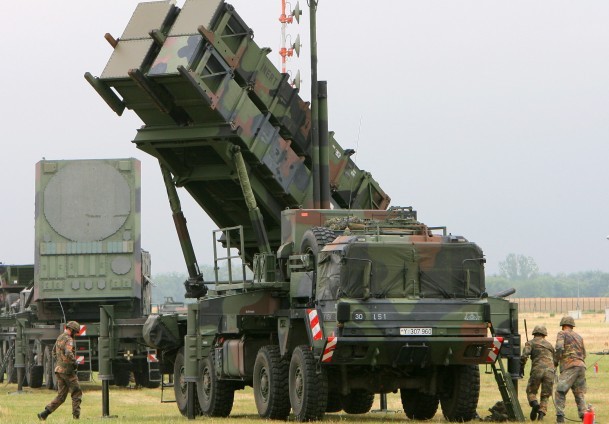Russia warns of 'hidden threats' over deployment of Patriot missiles at Turkish-Syrian border

By Sara Rajabova
As Turkish and NATO officials begin a joint survey of possible sites for the deployment of NATO's Patriot missiles near the Syrian border, two borderline provinces -- Gaziantep and Sanliurfa -- have emerged as the likely sites, Today's Zaman newspaper reported on Monday.
The Turkey-NATO survey team must take into consideration several factors while deciding on the site of deployment. These factors include proximity to the source of the threat, given that Patriots are designed to intercept missiles within a 50-80 kilometer range; convenient topography, as mountainous terrain would hinder the functioning of the radar system; and sufficient distance from power lines and facilities that create electromagnetic fields, which can disrupt transmissions between the missile batteries and the command center.
Three provinces, Sanliurfa, Hatay and Gaziantep, appear to meet these technical criteria. But non-technical factors are also expected to shape the final decision on the deployment sites, expected within the next few days. Turkish and NATO officials are also expected to take into account potential provocations from the Bashar al-Assad regime in response to the deployment of the defense system and the Kurdish factor in Turkey's southern provinces while surveying possible sites for the deployment of the missiles, according to Today's Zaman.
With these considerations in play, the missile system will unlikely be installed in Hatay, half of whose population is of the same sect as Syria's Assad. Diyarbakır, where a majority of residents are Kurds, is also off the list, the report said.
Security sources say that if the Patriot missiles were constructed in these provinces, it is highly likely that spies of the Syrian government would agitate locals in the provinces against Turkey and the presence of NATO in the region. Thus, among the possible sites for the Patriot missiles, Gaziantep and Sanliurfa appear ideal for the deployment of the surface-to-air missiles, the sources said.
Russian Deputy Foreign Minister Andrey Denisov expressed Moscow's disapproval of the planned deployment of Patriot missile system at the Turkish-Syrian border.
"We don't like this idea because we see hidden threats in it," Denisov said at a news conference in Berlin after the opening of a two-day international congress on European security and defense known as the Berlin Security Conference, ITAR-TASS news agency reported on Tuesday.
"If these hidden threats are smoothed over or if our partners provide clear explanations of the real meaning of the decision to deploy these missiles, it will contribute to peace efforts," he noted.
"From the technical point of view and in terms of maintenance, the Patriot system is a complex system, whose personnel undergoes long training and can boast high professional skills," Denisov said. "It is a serious weapon and it must be targeted against serious challenges. That is why we have such questions as what kind of challenges it is aimed at and who threatens who and from where?"
However, Turkish Foreign Minister Ahmet Davutoglu earlier dismissed the Russian and Iranian concerns that possible deployment of NATO missiles along Turkey's southern border with Syria would make the crisis more complicated. He said that the missile system has a defensive purpose only and it would not be operational unless there is a risk to Turkey's security.
According to Denisov, the deployment of Patriot missile systems along the border with Syria might stem from plans to establish the so-called no-fly zones, which have not been made available to Moscow. "If it implies restrictive measures against Syria, such measures must be sanctioned by the United Nations Security Council."
But, the Turkish General Staff said Monday that the system was not for a "no-fly zone or offensive operations", but just for use "against an air or missile threat from Syria."
Denisov said the deployment of Patriot missile systems at the Turkish-Syrian border would rather create more problems than solve any.
"In a nutshell, we believe that the decision [to deploy missiles] is creating more problems than it might solve. This is why Moscow showed restrained attitude towards this idea," he said.
Recently, Turkey asked NATO to deploy missile defense elements on its 900-km (560-mile) border with Syria to boost its air defense systems as the conflict in its southern neighbor deepens.
NATO responded positively to Turkey's request for a Patriot system, made in a bid to gain support for the country's air defense system, and a NATO delegation including 30 experts from the United States, Germany and the Netherlands has arrived in Turkey to negotiate on deployment of the missile defense system.
The move highlighted Ankara's fears that the situation on its border could deteriorate rapidly and echoes its calls for military support during the two Gulf Wars, when NATO deployed surface-to-air missiles on its soil in 1991 and 2003.
Germany, the Netherlands and the United States are the only three NATO allies with appropriate Patriot surface-to-air missile systems available.
The Patriot missiles deployed to Turkey during the Gulf Wars were provided by the Netherlands.
Here we are to serve you with news right now. It does not cost much, but worth your attention.
Choose to support open, independent, quality journalism and subscribe on a monthly basis.
By subscribing to our online newspaper, you can have full digital access to all news, analysis, and much more.
You can also follow AzerNEWS on Twitter @AzerNewsAz or Facebook @AzerNewsNewspaper
Thank you!
